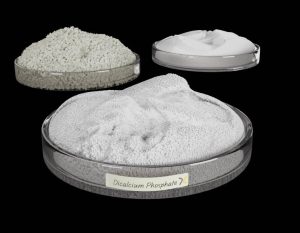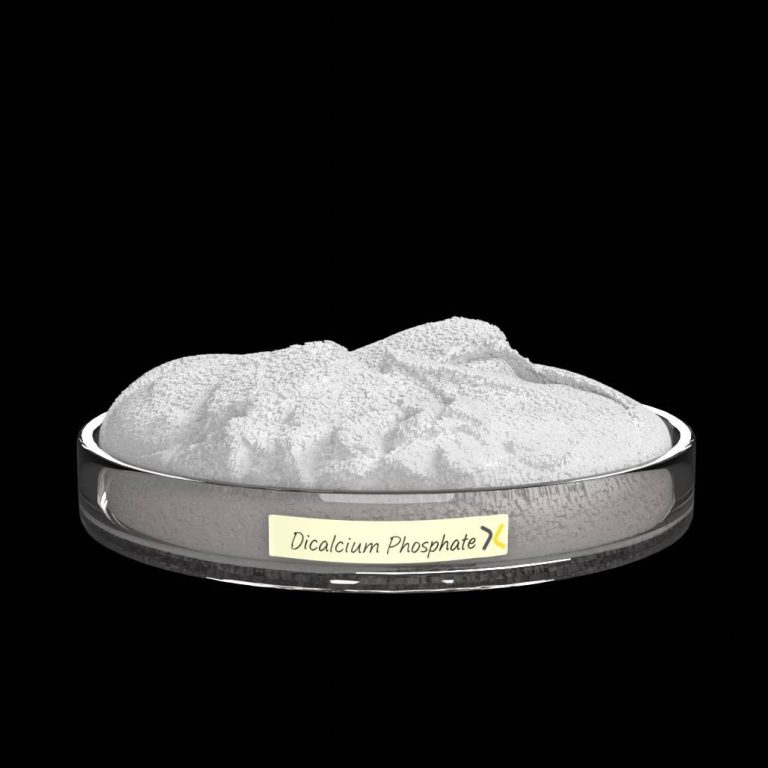Differences in Forms of Dicalcium Phosphate in Poultry Diets: Which Form is More Popular?
Dicalcium phosphate (DCP) is used in poultry diets in three main forms: powder, granule, and crystalline. Each form has its own advantages and disadvantages, which will be discussed in detail below:
1. Dicalcium Phosphate Powder
Advantages:
- Rapid Absorption: Due to its larger surface area, it has faster absorption and higher efficiency in the digestive system of poultry.
- Uniform Distribution: Easily mixes into the feed, ensuring more uniform distribution.
- Lower Cost: Generally, less expensive compared to granule and crystalline forms.
Disadvantages:
- Dust Formation: Creates dust during transportation and use, which can pose health risks for workers and animals.
- Moisture Absorption: High moisture absorption can lead to clumping and reduced product quality.
2. Dicalcium Phosphate Granule
Advantages:
- Dust Control: Produces less dust compared to the powder form, enhancing hygiene and safety.
- Stability in Feed: Less affected by moisture, maintaining product quality for a longer period.
- Good Absorption: Provides consistent nutrient availability for poultry.
Disadvantages:
- Higher Cost: Typically has higher production and selling costs compared to the powder form.
- Special Equipment Needed: This may require specific equipment for mixing and incorporation into the feed.
3. Dicalcium Phosphate Crystalline
Advantages:
- Reduced Dust Production: Like granules, it produces less dust.
- Suitable for Specific Diets: Ideal for diets that require a specific form of Dicalcium phosphate.
Disadvantages:
- Higher Price: Usually more expensive than powder and granule forms.
- Limited Application: Its use may be restricted in certain dietary formulations.
Which Form is Better?
Choosing between these three forms depends on the specific conditions of the farm and the needs of the poultry. Based on the advantages and disadvantages, we can say:
- Powdered Dicalcium Phosphate: Suitable for farms looking for quick absorption and uniform distribution, and who can manage dust issues.
- Granular Dicalcium Phosphate: Preferred by many farms due to better dust control and greater stability in humid environments.
- Crystalline Dicalcium Phosphate: Usually chosen for specific applications and special diets.
Most Popular Form of Dicalcium Phosphate in Poultry Diets
In the poultry feed market, all three forms of Dicalcium phosphate (powder, granule, and crystalline) are used, but some are more popular than others. The choice depends on various factors such as efficiency, cost, and feed management.
Most Popular Form: Granular Dicalcium Phosphate Reasons for Popularity:
- Reduced Dust: One of the main issues with powdered Dicalcium phosphate is dust production, which can cause health problems for workers and animals. Granular Dicalcium phosphate minimizes this issue, creating a cleaner and safer work environment.
- Stability and Durability: Granules are more resistant to moisture, thus maintaining their quality over time. This is particularly important in high-humidity areas or during rainy seasons.
- Ease of Management and Transportation: Granules do not clump together like powders, making them easier and more cost-effective to handle and transport.
- Uniform Distribution in Feed: Granular Dicalcium phosphate mixes easily into the feed, providing a more consistent distribution of nutrients, which is crucial for proper poultry nutrition.
Market Demand and Purchase Trends
According to market surveys and industry reports, granular Dicalcium phosphate has the highest demand and purchase rate due to its aforementioned benefits. It is widely used by poultry farmers globally.
Powdered and Crystalline Dicalcium Phosphate
Powdered Dicalcium Phosphate:
- Still used in some farms, especially where initial cost savings are prioritized.
- May be preferred in feeding systems where dust management is not a significant issue.
Crystalline Dicalcium Phosphate:
- Typically used for specific applications and special diets.
- Due to its higher cost and limited application, it has less demand compared to granules.
Conclusion
In summary, granular Dicalcium phosphate is the most widely purchased and used form in poultry diets due to its operational and managerial advantages. However, the choice of form should be based on the farm’s specific needs, environmental conditions, and budget. Consulting with poultry nutrition experts can help make the best decision.
About Kaladasht Trading Company
Kaladasht Trading Company, a member of the Iranian Grain Association, is an importer and supplier of various feeds, grains, ingredients, and supplements. As the exclusive distributor of Zarin Mahd Shimi products, the company leverages its expertise to meet the nutritional needs of livestock and poultry, enhancing the quality of feed rations. For more information and to place orders, please contact us.



